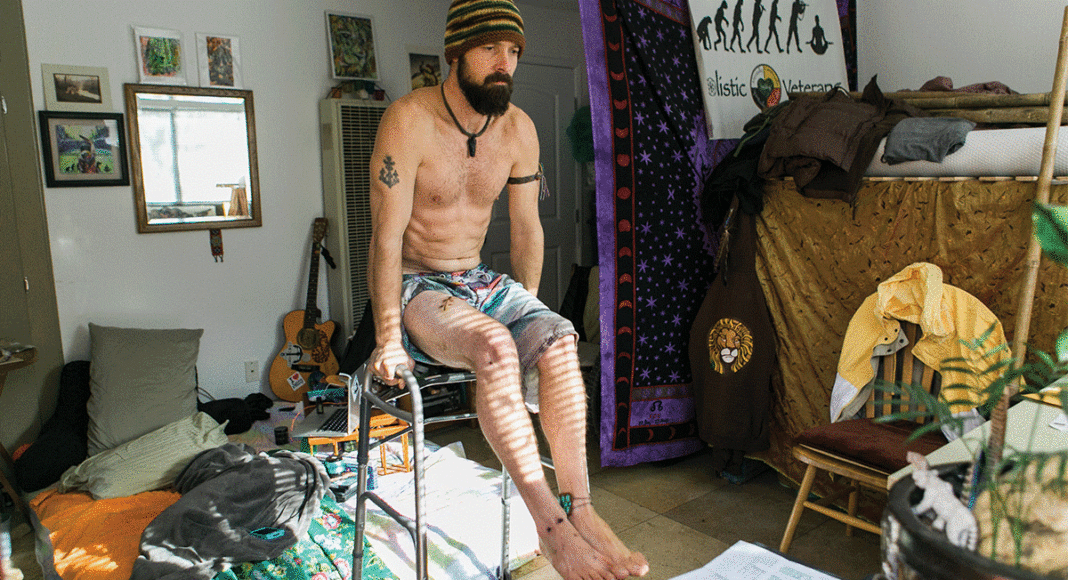[This is part two of a series on veterans and public safety. Part one ran last week.]
Paul Damon woke up five times in the middle of the night on Saturday, Jan. 14. Each time, he told himself that he should climb off the lofted bed in his studio apartment on Cedar Street and lock the front door, but his back had seized up from a day of shoveling dirt.
The fifth time, Damon, a veteran, woke and said, “Ain’t nobody coming up in here, anyway.” But the next thing he heard was “Wake up, motherfucker. Give me your money, or I’m gonna shoot you.”
Down below, a man with long dreadlocks was yelling at Damon’s friend Adam Binckley, another veteran who was crashing that night on Damon’s spare bed.
Damon remembers that night vividly, as he sits on his mattress, which is now resting on the floor. Blankets and sheets off to the side, Damon’s wearing only a pair of pale plaid blue boxers, which are safety-pinned up high on his right leg, revealing a strap of gauze over a scabbing gash and layers of stitches on his thigh. Damon, founder of the nonprofit Holistic Veterans, says the experience taught him the value of a strong community and strengthened his understanding of spirituality. Using the type of healing practices he advocates at his nonprofit, he believes he’s been able to speed up his recovery.
Property crime in Santa Cruz is notoriously high, among the highest in the state. According to newly compiled police statistics, there were 3,620 reported property crimes last year. After declining in 2013, such crimes have trended up slowly, increasing by 14 percent over the three years since.
That January night in his apartment, Damon wanted to take a swing at the suspect—who Damon says was visibly drugged-out—but he couldn’t bring himself to do so. Once the man, who wore a green raincoat and short beard, sprinted out the door with an armful of medical cannabis and cash, Damon bounded after him, taking long strides. He leapt forward, arms outstretched to tackle the suspect as he fumbled with the apartment complex gate.
Chasing after someone in a situation like this, Binckley advises, is never a safe bet. “Speaking as a martial artist and a former weapons inspector in the military, I would never advise anyone to go after someone with force if he may have a weapon,” he says. “There are too many instances of people getting their lives lost.”
As Damon soared through the air toward the thief, he heard a booming voice in his head—a “spirit,” Damon calls it—ask “‘What the fuck are you doing? You are not allowed to harm yourself or others any longer.’”
Damon tried to punch the suspected burglar, but instead felt his hands glide slowly over the top of the man’s head. He was attempting to do a hip-throw, a judo move that he learned in the Army, when suddenly he felt a knife pierce his leg’s skin, tear deep into his thigh, poke out the other side and then come back out again the way it came in.
As the two men fell to the ground, Binckley came running down the path and proceeded to lob punches at the suspect. Damon pulled the man’s pants down, so that he wouldn’t be able to run, and gripped his dreads, accidentally pulling some out of the crown of his head.
“I just felt horrible about that part of it,” Damon reflects. “The guy’s messed up on drugs. I still felt bad that he took the beating he did, and I’m also very thankful for Adam being there, because if he wasn’t there, I’d have had my ass whipped and handed to me 10,000 times over.”
Damon says he learned early that morning about the strength of his community, as people came out of their homes before sunrise to call 911, talk to law enforcement and stay with Damon as he bled on the sidewalk. That kind of commitment to community, he says, is the only way to make neighborhoods safer.
As he sat there, a neighbor came up and told him the same burglar had just broken into her house as well, and had been trying to get in bed naked with her. Damon says he decided this was all just a part of his call to service, something that he feels didn’t end when he left the army.
Every medical expert who saw the wound said it was a miracle that it didn’t sever any arteries or tendons. It did rip a muscle in half, though; Damon has been rebuilding it through exercise.
Damon spent four nights in the trauma room at Santa Clara Valley Medical Center. He avoided eating hospital food, and his friends brought him large bowls of kale salad. He practiced meditation and found unique breath patterns.
In the weeks since, medical staffers have been impressed with his recovery, interviewing him to see how he has improved so quickly and avoided developing Post-Traumatic Stress Disorder (PTSD)—or, as Damon calls it, “simply post-traumatic stress.” As a vet who’s suffered from the condition before, he doesn’t like the word “disorder” because, he says, “it isn’t a positive outcome. It doesn’t leave the door open for growth.”
After he returned home, he caught up with his friends in the veteran community who lived two blocks over. “A couple of vets said they heard the screams, but they didn’t come because they didn’t know it was me. It’s like, ‘Man, if you hear screams like that, you should always go. You’re a veteran. Remember that,” Damon says.
But haven’t veterans done enough, after already putting their lives on the line for their country overseas?
“To me, service is what feeds a veteran’s soul. It’s a key component of a veteran’s healing process when they come back—remembering that they are here to serve,” Damon says. “It’s not something you signed up for. It’s something you were born with.”













